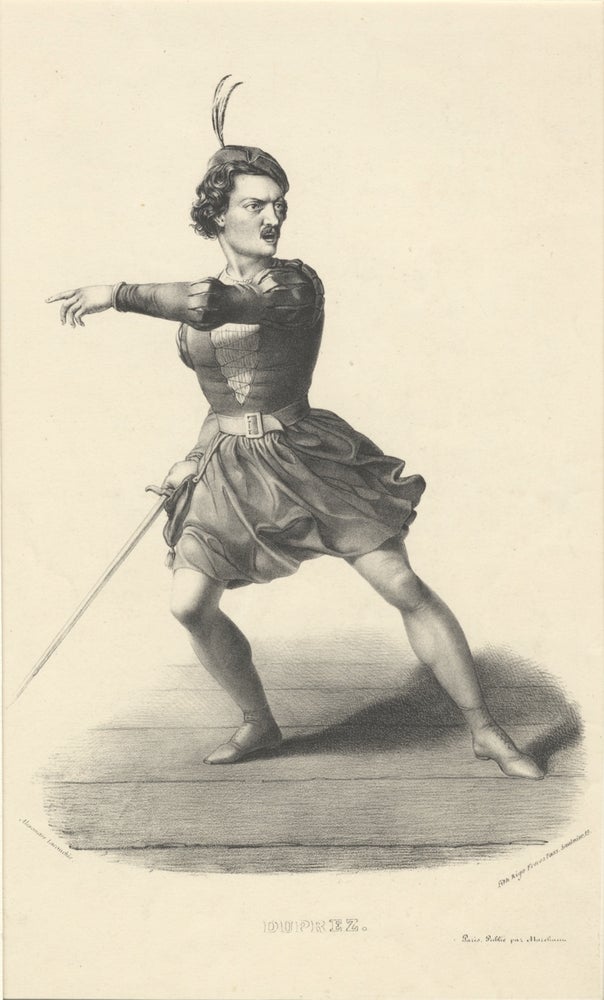
Role portrait as Arnold from Rossini's Guillaume Tell. Lithograph by Alexandre Lacauchie
Paris: Rigo Frères; Marchant, [1841].
Image size 210 x 155 mm, sheet size 304 x 222 mm. On chine appliqué. Full-length, standing, holding sword and pointing with left arm. With "Lith Rigo Frères Pass. Saulnier, 19" at lower right and "Alexandre Lacauchie" at lower left.
Published in the Galerie des Artistes Dramatiques.
From the collection of the distinguished American mezzo-soprano Marilyn Horne (b. 1934).
Slightly worn; minor soiling to right edge and blank margin; tape remnants and hinge mount to verso.
Béraldi VIII, p. 288, 1. Hall I, p. 399, 9. Arrigoni & Bertarelli 1399.
French tenor and composer Gilbert Duprez started his career in Italy, staring in a number of operas by his friend Donizetti, most notably that of Edgardo in Lucia di Lammermoor (1835). His first performance at the Paris Opéra was in Guillaume Tell, where: "His ‘chest’ C, in spite of the disappointment of Rossini, who compared it to ‘the squawk of a capon with its throat cut’, aroused wild enthusiasm and affected the taste of the public, who would listen to Guillaume Tell only when Duprez was singing." (Sandro Corti, Grove Music Online) Duprez went on to create the title roles in Berlioz's Benvenuto Cellini (1838) and Donizetti's Dom Sébastien (1843), as well as Albert in Auber's Le lac des fées (1839), Fernand in Donizett's La favorite (1840), and Gaston in Verdi's Jérusalem (1847)."
"Gradually he became the first great tenore di forza, despite a vocal tessitura limited in its lower range (as shown in his refusal to sing Pollione in Norma at Rome in 1834). In France he was praised as the first true Romantic tenor and for his excellent declamation and the smoothness of his canto spianato; but his acting style was said to be exaggerated. Presumably through forcing his voice, and also because of the great number of performances he gave during his years in Italy where he had to sing as many as six times a week, a decline set in early; Berlioz greatly admired him in the vigorous music of Benvenuto Cellini in 1838, though noting (Mémoires) that his voice had coarsened somewhat. The story of the famous tenor’s rise and fall in Berlioz’s Les soirées de l’orchestre is largely based on Duprez’s career. He composed a number of operas and his writings include L’art du chant (1845) and Souvenirs d’un chanteur (1880), a valuable account of his times and distinguished contemporaries." Sandro Corti in Grove Music Online.
"Horne had a voice of extraordinary range, rich and tangy in timbre, with a stentorian chest register and an exciting top... In concert she once achieved the feat of singing in a single programme Rossini arias and Brünnhilde’s Immolation Scene, proof of her exceptional versatility. Throughout her lengthy career she was an admired recitalist, singing lieder, mélodies, Spanish and American songs with equal aplomb." Alan Blyth in Grove Music Online.
Item #31486
Price: $150.00 other currencies
